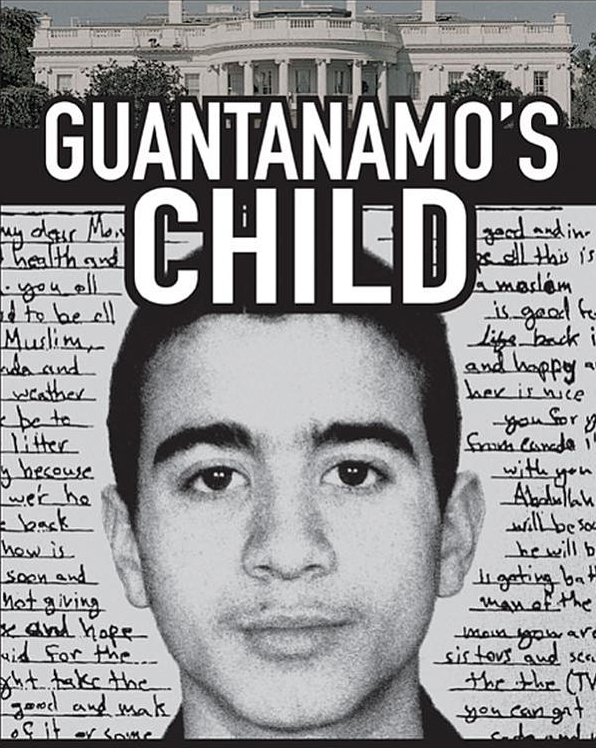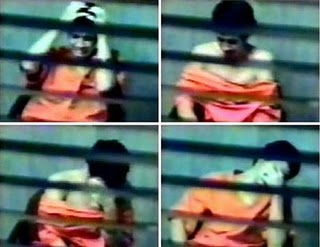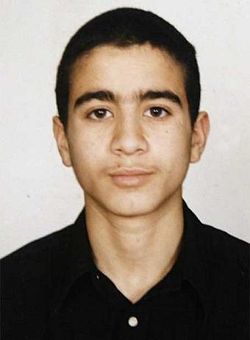
BRIARPATCH: You’re 15 years old, in the company of hardened militants who are associates of your father. A foreign army has invaded the country and unleashed a massive bombing campaign. Soldiers come knocking one morning and demand entry. The men around you refuse and a firefight ensues, culminating in the occupying air force bombarding the compound you’re in, killing everyone but you and one other person. What happens next is disputed. As the soldiers enter the bombed-out compound a grenade is thrown and explodes near one of them. He later dies of his wounds. Based on witness reports, the thrower could have been one of three people: you, the man lying beside you, or a U.S. soldier outside the compound wall. The man beside you is shot by an advancing soldier as he reaches for an AK-47 lying beside him. Cowering in the corner, you, in turn, are shot twice in the back. As shock sets in, you plead with the soldiers to kill you, to finish the job. You are Omar Khadr. Your ordeal has barely begun. MORE
 WASHINGTON POST: Omar Khadr, the youngest detainee at Guantanamo Bay, Cuba, was 15 when he allegedly threw a grenade that killed a U.S. Special Forces medic in Afghanistan. Now, more than seven years later, Khadr is drawing the Obama administration into a fierce debate over the propriety of putting a child soldier on trial. The struggle against al-Qaeda has thrown up few detainees with as baleful and unlikely a background as Khadr’s — a father who moved his family to Afghanistan and inside Osama bin Laden’s circle of intimates when Omar was 10; a mother and sister who said the Sept. 11, 2001, attacks were deserved; and a brother, the black sheep of the clan, who said he became a CIA asset after his capture in Afghanistan.
WASHINGTON POST: Omar Khadr, the youngest detainee at Guantanamo Bay, Cuba, was 15 when he allegedly threw a grenade that killed a U.S. Special Forces medic in Afghanistan. Now, more than seven years later, Khadr is drawing the Obama administration into a fierce debate over the propriety of putting a child soldier on trial. The struggle against al-Qaeda has thrown up few detainees with as baleful and unlikely a background as Khadr’s — a father who moved his family to Afghanistan and inside Osama bin Laden’s circle of intimates when Omar was 10; a mother and sister who said the Sept. 11, 2001, attacks were deserved; and a brother, the black sheep of the clan, who said he became a CIA asset after his capture in Afghanistan.
This background has convinced U.N. officials, human rights advocates and defense lawyers that Khadr, a Canadian citizen, was an indoctrinated child soldier and, in line with international practice in other conflicts, should be rehabilitated, not prosecuted. “The U.N. position is that children should not be prosecuted for war crimes,” said Radhika Coomaraswamy, the U.N. special representative for children and armed conflict, after meeting administration officials in October. But U.S. government officials said they expect to go to trial at Guantanamo Bay in July and will put Khadr before a jury of military officers on multiple war crimes charges, including murder. Attorney General Eric H. Holder Jr. has said that the Khadr prosecution is one of six detainee cases assigned to a military commission rather than federal court.
Holder’s decision initially drew little notice amid the clamor that followed the simultaneous announcement that Khalid Sheik Mohammed and four other alleged conspirators in the Sept. 11 attacks would be tried in New York. But the Khadr case could prove to be another lightning rod in the debate over the administration’s detention and prosecution decisions, sparking the kind of international scrutiny that few other military tribunals will generate. Khadr’s fate seems increasingly certain. Last month, Canada’s Supreme Court ruled unanimously that it would not compel the Canadian government to seek his repatriation, as it had been previously ordered to do. Now, Khadr’s case will probably be the first full military commission trial under President Obama. MORE
ELLIOTT SMITH: Pitseleh
[The interrogation of Omar Ahmed Khadr set to the tune of “Pitseleh” by Elliott Smith, directed by JAMES DOOLITTLE]
WIKIPEDIA: Omar Ahmed Khadr (??? ???? ???, born September 19, 1986) is the fourth child in the Canadian Khadr family. He was captured by American forces at the age of 15 following a four-hour firefight with militants in the village of Ayub Kheyl, Afghanistan.[1] He has spent six years in the Guantanamo Bay detention camps charged with war crimes and providing support to terrorism after allegedly throwing a grenade that killed a US soldier.[2] A Canadian citizen born in Toronto,[3][4] he is the youngest prisoner held in the Guantanamo Bay detention camp by the United States and has been frequently referred to as a child soldier.[5][6] The only Western citizen remaining in Guantanamo, Khadr is unique in that Canada has refused to seek extradition or repatriation despite the urgings of Amnesty International, UNICEF, the Canadian Bar Association and other prominent organisations.[7][8][9][10] Khadr is the only Guantanamo detainee who has faced a judge and who is not boycotting the military tribunals.[11] In February 2008, the Pentagon accidentally released documents that revealed that although Khadr was present during the firefight, there was no other evidence that he had thrown the grenade. In fact, military officials had originally reported that another of the surviving militants had thrown the grenade just before being killed.[12]
detainee who has faced a judge and who is not boycotting the military tribunals.[11] In February 2008, the Pentagon accidentally released documents that revealed that although Khadr was present during the firefight, there was no other evidence that he had thrown the grenade. In fact, military officials had originally reported that another of the surviving militants had thrown the grenade just before being killed.[12]
CTV: A military judge has dismissed charges against Canadian detainee Omar Khadr, who was 15 when he was captured in Afghanistan, saying the case is outside his jurisdiction….Khadr had been classified as an “enemy combatant” by a military panel years earlier. But because he was not classified as an “alien unlawful enemy combatant,” Army Col. Peter Brownback said he had no choice but to throw the case out. “The charges are dismissed without prejudice,” Brownback said as he adjourned the proceeding. Under the Military Commissions Act, which U.S. President George Bush signed last year after the Supreme Court threw out the previous war-crimes trial system, only those classified as “unlawful” enemy combatants can face war trials there. “Obviously there are illegal enemy combatants and then there are legal enemy combatants,” Clark said. “In other words if you’re wearing the uniform of another country, just because you fired a shot in anger at an American soldier doesn’t mean that it is illegal,” Clark said. MORE
